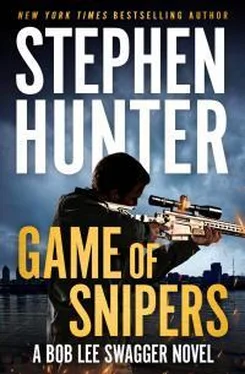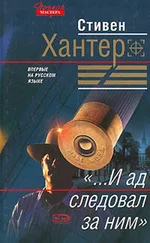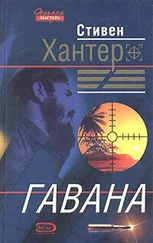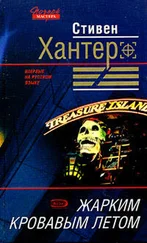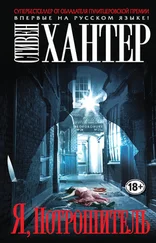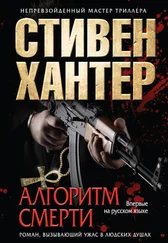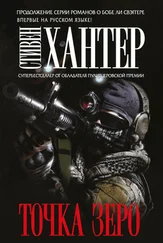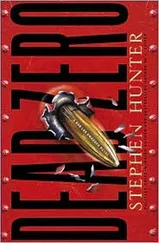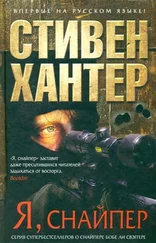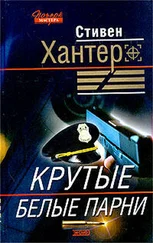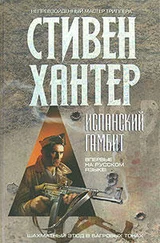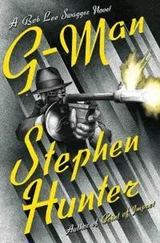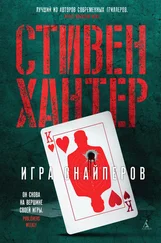They turned right, unconfronted, because as a self-contained, inward-directed family unit, they were off the cops’ radar. They went to the curb, the feds too forward-oriented to look peripherally, too busy setting up exactly as ordered, too hungry for a genuine terrorist to notice them.
It would be seconds before more cops flooded the area, and now the olive chopper took over the auditory universe as its rotors beat the air on the descent. Risking a peek back, Jared saw it land two hundred feet from the Impala, and two more men hurtled out of it.
They stood there, naked to all eyes yet rendered invisible by the beaming woman, who was having the time of her life.
A van materialized before them.
“My dear, I must leave,” crooned Juba, and gave her a kiss on the cheek. She sighed, having had a wonderful date, if a bit of a truncated one.
Men pulled them in and flattened them out.
“Lie in here,” someone said, opening a hatch in the floor like the lid of a coffin, and they rolled in, seeing the light disappear as the hatch was closed behind them.
But Jared had gotten a glimpse of the save team.
They were Mexicans.
Greenville (III)
The sweep was done, and they had nothing.
“Fuck,” said Nick.
“This guy’s the best,” said Bob.
“I know my people were on plan,” said the colonel who supervised Ohio’s Highway Patrol and stood with them near the garden at the center of the mall under plastic palm fronds and next to gurgling toxic water in a filthy open sewer among the palms’ fake terra-cotta pots. “Nobody got out after we commenced our operation. There was just a few seconds there where the cars hadn’t quite gotten to all the exits.”
“Colonel, your people did fine, I’m sure,” said Nick. “And a nod to Greenville, they helped too. I’m just thinking I should have sent the cover cars in first, without siren and flashing lights. When they were in position, we hit the Impala with SWAT.”
“There was hardly time to consider everything,” the colonel said. “The doors were covered within two minutes, maybe one. I don’t know how anybody could have made it out.”
“Anybody couldn’t have. But this guy, he could have,” said Nick.
The search continued, but now at a slower pace. Closets opened by heavily armed police, civilians cleared and let go, aisles and bins explored and probed, storerooms and break rooms penetrated. It might, it could, maybe it would, yield something — but neither Nick nor Bob held out much hope.
Meanwhile, FBI techs dusted the car for prints and in a fast first pass had come up with two of Juba’s right thumb, and lots of others, which meant that one trophy of the operation — a consolation prize, to be sure — would be a whole set of prints. They also noted a pile of plastic grit in the well of the backseat and half the butt of a shotgun.
“He’s cut it down for practicality,” said Bob. “He can hide it better, pull it out fast.”
Nick nodded, then he had to go back to the phone for the tenth time. This round, he was on it with D.C. for a long time, explaining, taking responsibility, offering his resignation twice, both times turned down, because the people there only were interested in one thing: what does Swagger think?
“They think you’re a god. Don’t worry, I won’t tell them the truth. Anyway, talk to them.” He handed the phone over.
“Swagger.”
“You’re on speakerphone with the Director and four Assistant Directors and the head of the Counterterrorism Division,” said the voice.
“What can I do?” said Swagger.
“Your read, please, Mr. Swagger.”
“We almost got him. We know he was there. In my humble, Director, Memphis put together a brilliant plan on the fly and—”
“Swagger, no, leave that for later. Tell us where you think we are and what you think is next.”
“I would just add that we have consistently underestimated this guy.” Oops, maybe that was selling out Nick. Can’t do that. “I mean, I have continually underestimated this guy. Everything we throw at him is nothing new. He’s done it before. He doesn’t panic, he doesn’t quit, he improvises. He’s a pro’s pro.”
“Your next move would be … ?”
“Well, I wouldn’t set up roadblocks. He’ll never give in to that. On top of that, we don’t know who helped him split, and in what vehicle. He may be with another cell — four guys with light machine guns and RPGs, and if some country cops out in the haystacks bounce them, it could go to guns in a bad way, with a lot of people — cops and civilians — going down. The one thing we know is, he’s got a cut-down Remington 1100 on him, and that’s a big, bad toy. You don’t want him going Remington on you, which is what he’ll do if you corner him. You have to ambush him. You have to be there first, and let him walk into it, and take him hard, with overwhelming force. Still dangerous, but maybe one degree less so. So I’d go back to the brainiac stuff.”
“Our analysts?”
“I think some hard thinking by your top people should come up with some possibilities that would narrow the search areas. Given what we think he’s going to do, he’s got to have certain things. We have to anticipate him. Along those lines, Nick wants to set me up with a computer genius. I think that’s a good idea. I have a series of attributes he will need to have at his disposal to move on to the next step, maybe you could use that as some kind of index or filter, or something.”
“All right, taken into consideration. Put Memphis back on.”
So Nick talked to them for a few more minutes, and then a Greenville detective came up, whispered to a sergeant, who whispered to the colonel, who indicated something to Nick.
Nick ended the call.
“We’ve got them on surveillance footage from McDonald’s. You guys want to take a look?”
* * *
It was him, no doubt. Not in the center of the frame, not in the cone of focus, but definitely a man of intimidation and danger. He sat in a booth just off the cash register and delivery counter and, by a twist of fate, facing toward the camera, while his companion, sitting across from him, was just the back of the head.
He wolfed down two burgers and a soft drink, seemed to savor the French fries, and looked to be engaging in conversation with the boy. Meanwhile, in a box in the corner of the frame, integers raced by that indicated number of frames and time of day.
“Looks like McDonald’s has a fan,” said Nick.
“Nobody don’t like them fries,” said Bob. “Freeze it, please.”
They were in the mall security office, amid a bank of video screens, all of them recording and feeding from various key spots around the installation. The McDonald’s had three cameras, because ruckuses were most likely to start in spots where teenagers gathered. Thus, all things considered, it was a pretty good show.
“We’ll need to ASAP this to D.C. Our labs can enhance. Maybe we’ll get a clearer picture, something we can put out. That would cut way down on his maneuverability and operational freedom.”
Bob looked at the blurred image.
“Can you bring it up?”
“No, sir,” said the mall security boss. “It’s mainly meant for figuring out what kid hit what other kid.”
“Got it,” said Bob.
He stared at the image, but the more he bored into it, the more incoherent it became, until it was just a fuzzy mess of pixels, losing all form and content. What he saw was what he expected, but nothing actionable. His head was big; it went with his big frame and big hands, which were seen dwarfing the individual French fries as he ate them. He was clearly in command, but, in actual point of fact, he didn’t look particularly fierce: a big guy, but no different than a million other men in other malls. Not bad-looking. Baseball cap — black, no insignia — a hoodie, jeans, the shoes not visible. Clean-shaven, not that fake tough look movie stars and podiatrists affected these days. Everybody wanted to look tough, while this guy, and all true tough guys, just wanted to blend in.
Читать дальше
